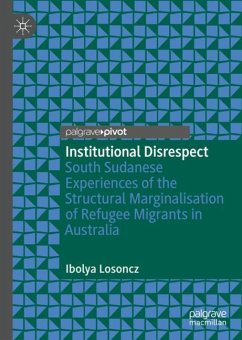This book is about the institutional disrespect experienced by refugee immigrants at the hands of the state and its institutions. The desire to be treated respectfully is not felt only by refugees, but they are a much higher risk of not receiving it. Using a case study of recently settled South Sudanese Australians, the author uncovers the social realities of their marginalisation and examines how blocked pathways to cultivate collective and self-identities can lead to a breakdown of social bonds between immigrants and social institutions. Institutional Disrespect invites us to take a fresh look at whose responsibility it is to address the disrespect felt by immigrants and other marginalised groups, and argues that when disrespect comes in the forms of injustice, institutional mistreatment, or systemic in governance arrangements, the responsibility lies not with individuals but with the state, its institutions and its appointed bureaucrats. This book is about the institutional disrespect experienced by refugee immigrants at the hands of the state and its institutions. The desire to be treated respectfully is not felt only by refugees, but they are a much higher risk of not receiving it. Using a case study of recently settled South Sudanese Australians, the author uncovers the social realities of their marginalisation and examines how blocked pathways to cultivate collective and self-identities can lead to a breakdown of social bonds between immigrants and social institutions. Institutional Disrespect invites us to take a fresh look at whose responsibility it is to address the disrespect felt by immigrants and other marginalised groups, and argues that when disrespect is systemic in governance arrangements, or comes in the forms of injustice and institutional mistreatment, the responsibility lies not with individuals but with the state, its institutions and its appointed bureaucrats.
Bitte wählen Sie Ihr Anliegen aus.
Rechnungen
Retourenschein anfordern
Bestellstatus
Storno








